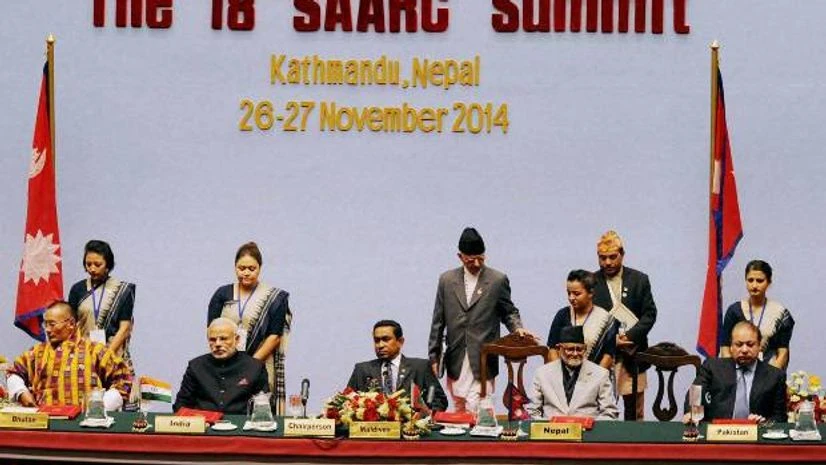Compared to the success of such regional organizations as the 10-member Association of South East Asian Nations (ASEAN) or the 27-member European Union or even the six member Shanghai Cooperation Organization (SCO), the eight-member South Asian Association for Regional Cooperation, or SAARC, has been an underachiever.
The reason for this isn’t hard to find – the tension between the two of the bigger member states - India and Pakistan have seldom seen eye to eye on efforts at regional cooperation.
Earlier this year, the SCO admitted India and Pakistan to expand its membership to eight but would now be wary that the two South Asian neighbours could bring their rivalry to the primarily Central Asian regional grouping, along with Russia and China, that has had significant achievements in promoting barrier free regional trade.
Increasingly, the 19th SAARC Summit, which Islamabad was slated to host looks a non-starter after India, Afghanistan, Bhutan and Bangladesh – four of the eight members – have pulled out.
Previous SAARC Summits have had an uneasy history. Article III of the SAARC Charter suggests that the heads of state or government of SAARC member states “shall meet once a year or more often as and when considered necessary by the member states.
Initially, it was even called the ‘Annual SAARC Summit’. The “once a year” suggestion, however, could seldom be followed.
More From This Section
Let's take a look at the history of SAARC Summits and how they fared.
First Summit, Dhaka, 7-8 December 1985
Second Summit, Bengaluru, November 17, 1986
Third Summit:
The first Summit in Dhaka in 1985 concluded with the decision that the second will be held in Bengaluru and the third was to be hosted by Bhutan. However, Bhutan couldn’t. It was decided in the second Summit in Bengaluru that Nepal will host the third Summit. The Summit was held in Kathmandu on November 4, 1987.
Fourth Summit, Islamabad, 31st December, 1988
Fifth Summit: The fourth Summit ended on the last day of 1988 in Islamabad with member states planning to meet in Colombo in 1989. However, it became untenable for Sri Lanka to host the Summit because of internal disturbances. The fifth Summit was held in Male, the Maldivian capital on 23 November, 1990.
Sixth Summit: Sri Lanka eventually hosted the sixth Summit in Colombo on 21 December, 1991.
Seventh Summit: Bangladesh was to host the seventh Summit in 1992, which was delayed by a few months and it was held in Dhaka on 11 April, 1993.
Eighth Summit: India was to host the Summit in 1994. New Delhi hosted the Summit in 2-4 May, 1995. For the first time and learning from experience, the Summit ended by agreeing that the subsequent Summit was to be held in the Maldives but dates were to be decided after consultations between member countries.
Ninth Summit, Male, 12-14 May, 1997: It concluded by agreeing that the tenth Summit was to be held in Nepal and the 11th in Pakistan.
Tenth Summit: It couldn’t be held in Nepal, but in Colombo, Sri Lanka on 31 July, 1998. Leaders agreed that the next Summit will be hosted by Nepal in 1999. However, India-Pakistan tensions after their Kargil conflict in May-July, 1999, ensured that no Summit was held for the next three years.
Eleventh Summit, Kathmandu, 4-6 January, 2002: It ended with leaders agreeing to meet in Pakistan in early 2003.
Twelfth Summit, Islamabad, 4-6 January, 2004: With India-Pakistan relations being far from normal, the Summit could be held in Islamabad only in early-2004 but led to a breakthrough with both sides agreeing to start a composite dialogue.
Thirteenth Summit, Dhaka, November 2005: Dhaka was to host the Summit in January, 2005. India threatened to boycott the Summit after spate of terror attacks that New Delhi believed were carried out by terrorists sheltered by the Khaleda Zia government in Dhaka. It asked the Zia government to “introspect”. There was also the shadow of King Gyanendra of Nepal having imposed a state of emergency in his country. The Summit eventually took place in Dhaka on 13 November, 2005.
Fourteenth Summit, New Delhi, April 3-4, 2007
Fifteenth Summit, Colombo, 2-3 August, 2008: The previous Summit ended with the decision that the next was to be held in the Maldives. But the political uncertainty in that country and the first free presidential elections in which Mohamed Nasheed had a famous victory meant that the Summit was held in Sri Lanka.
Sixteenth Summit, Thimphu, 28-29 April, 2010: The previous Summit had ended with the decision that this one was to be hosted by the Maldives. However, the 26/11 terror attacks led to India severing its composite dialogue with Pakistan. The Summit also couldn’t be held. It was finally held in Thimphu and celebrated as the Silver Jubilee year of SAARC. It was famous for India’s PM Manmohan Singh and his Pakistani counterpart Yousaf Raza Gilani’s ‘walk in the park’ in Thimphu that revived the dialogue after the 26/11 terror attacks.
Seventeenth Summit, Addu City, the Maldives, 11 November 2011
Eighteenth Summit, Kathmandu, November 2014
Nepal was slated to host the 18th Summit in 2012 but repeated constitutional crisis and internal political uncertainty led to the Summit eventually being hosted in Kathmandu 26-27 November, 2014. That Summit was also marked by India-Pakistan disagreements over the Motor Vehicle Agreement. New Delhi succeeded in isolating Islamabad to sign the agreement with Bangladesh, Bhutan and Nepal.

)
